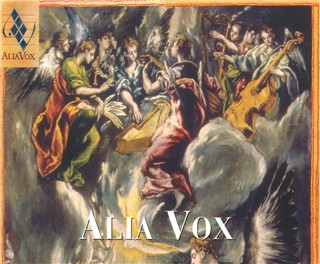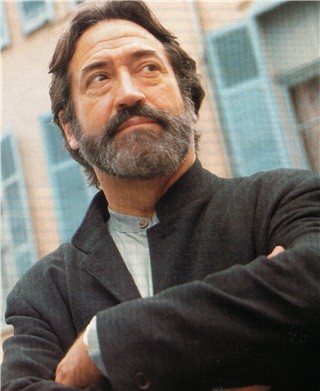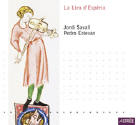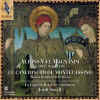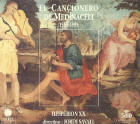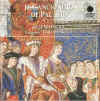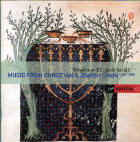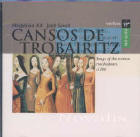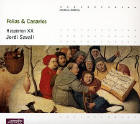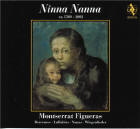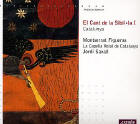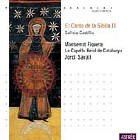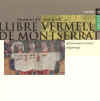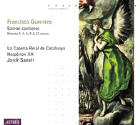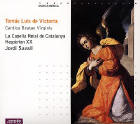Jordi Savall - Musician & Humanist
Autre voix
Another voice
Autre voix
Another voice
Photo: Classica # 28 (Décembre 2000)
La voix de l'interprète
A lifetime project
Back to one's origins
Savall is a man of duty who has assigned himself the task of recreating the musics of the past, pulling them out of oblivion These works were composed and performed at a time when music had a social function more widespread than nowadays; either in the context of the various European courts or within the context of the many religious rituals, or still, within the context of popular or vernacular festivities of the times.
Jordi Savall has always shown his preoccupation for the historical linkage of music, starting with the foundation of his first musical ensemble around 1975. Hespèrion XX is derived from the designation in ancient times of the two territories now known as Italy and Spain. Subsequently, Savall formed another ensemble in 1987 which was initially designated "La Capella Reial". Shortly after it was renamed "La Capella Reial de Catalunya" thus establishing a clear reference to his land of origin. Savall explains his will to link himself to one's origins in the following terms: "Catalunya is a very small province of Spain, its a small portion of the Iberian peninsula, a very small portion of what is called the Mediterranean world, from Morocco to Tunisia, from Italy and Spain, to the Middle East and within which a small nation like ours, is part of larger whole".
And he adds: "I come from an area of the wortld where the Muslim, Iberian, Italian, German and Jewish cultures are intertwined, an area where all this is embedded in the "popular" way of perceiving the world". This means that "... we learn that we are together with other cultures. In this context, the history of music becomes the living history of mankind"*.
This is a key concept for Savall while he is in fact quoting Elias Canetti. When being interviewd by Anne-Marie Dusseault (Radio-Canada, March 3, 2001), he expresses himself further on this theme: "Early music is, to a certain extent, the history of Humanity's belly..." "It is the most universal language, it is the language of man". For Savall, "the magic of early music (is linked) to the magic of things that have disappeared...",(it is) "... the memory of civilization". And "...a civilization which has no memory, is a civilization that has no future".
Jordi Savall, Montserrat Figueras, his wife, and all the others that followed in their footsteps have embarked upon a search for their own roots, Catalunyan, Spanish, European. This explains why Hespèrion XX has been renamed Hespèrion XXI, thus showing clearly that these are musicians from our century who ar at work. The new name of the ensemble signifies a transition to a new stage "... which is both the proclamation of our roots and of our will to move onward. We are thus expressing our desire to remain "contemporary" and our conviction that music has as its vocation to be a universal language of peace and brotherhood".
* François Tousignant, Le DevoirEloquent testimonies Early instruments
La lira d'Espéria - La vièle médiévale - The Medieval fiddle
"Musicas Reales" : Court music
Alia Vox 9814
Carlos V
Mille Regretz:
La Canción del Emperador
(1459-1558)
Alia Vox 9816
Alfons V el Magnànim
(1396-1453
El Cancionero de la Colombina (1451-1506)
La musique au temps de Christophe Colomb / Music in the times of Christopher Columbus
El Cancionero de Medinaceli (1535-1595)
La musique au temps de Philippe II / Music in the times of Philip II
El Cancionero de Palacio (1474-1516)
La musique à la cour des rois catholiques d'Espagne / Music at the court of the Catholic kings of Spain
El Cançoner del Duc de Calabria (1526-1554)
La musique à la cour valencienne
du duc de Calabre / Music at the Court of the Duke of Calabria in Valencia
Viva Rey Ferrando
Renaissance music from the Neapolitan Court, 1442-1556
"Raices & Memoria" : Roots and memories from secular sources
Alia Vox 9809
Diáspora Sefardí
Secular Music from Christian and Jewish Spain / Musique profane de l'Espagne chrétienne et juive
Cançons de la Catalunya mil-lenària
Plaintes et légendes / Laments and Legends
Chansons des Trobairitz, vers 1200 / Songs of the Trobairitz, about 1200
Vilancicos y Danzas Criollas
"De la Iberia antigua al nuevo mundo" -
(1550-1570)
Folias et Canarios
Ninna Nanna / Berceuses - Lullabies
(ca. 1500-2002)
Del Enzina, Juan
(1468-1529)
Romances et villancicos (Salamanca 1496)"Raices & Memoria" : Roots and memories from religious sources
Cantigas de Santa Maria
El Cant de la
Sibil-la I
Catalunya
El Canto de la
Sibila II
Galicia - Castilla
El Cant de la
Sibil-la
Malorca - Valencia
Llibre Vermell de Montserrat
Un pélérinage du XIVe siècle /A fourteenth-century pilgrimage
Cererols, Joan
Messe pour les défunts (Missa pro defunctis / Missa da Batalla)
Guerrero, Francisco
Sacrae cantiones
(1555, 1570)
Morales, Cristóbal de
Officium Defunctorum / Missa Pro Defunctis
Victoria, Tómas Luis de
Cantica Beatae VirginisCliquez l'un ou l'autre thème ci-dessous
pour continuer en français.
Savall - le violiste
2) Savall - le chef
3) Savall - l'entrepreneur
4) Savall - l'humaniste
5) Savall - pédagogue et chef de file
Click either theme below
to continue with the English version.
Jordi Savall under 5 themes:
1) Savall - as violist
2) Savall - as conductor
3) Savall - as entrepreneur
4) Savall - as a humanist
5) Savall - as a pedagogue and figurehead


